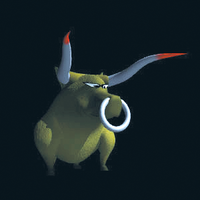There are currently 0 stubs. You can help us by expanding these articles!
Difference between revisions of "El Toro"
m (wording) |
(clarifying more) |
||
| Line 7: | Line 7: | ||
|comparable = [[Goat]] | |comparable = [[Goat]] | ||
}} | }} | ||
'''El Toros''',<ref>''Spyro the Dragon'' Prima's Official Strategy Guide, page 18.</ref> also named '''Bulls''',<ref>''Spyro the Dragon'' Prima's Official Strategy Guide, page 19.</ref> are large bull enemies who appear in the first game, ''[[Spyro the Dragon (video game)|Spyro the Dragon]]''. They are only encountered in the [[Town Square]] [[realm]]. At first, an El Toro is | '''El Toros''',<ref>''Spyro the Dragon'' Prima's Official Strategy Guide, page 18.</ref> also named '''Bulls''',<ref>''Spyro the Dragon'' Prima's Official Strategy Guide, page 19.</ref> are large bull enemies who appear in the first game, ''[[Spyro the Dragon (video game)|Spyro the Dragon]]''. They are only encountered in the [[Town Square]] [[realm]], and are essentially stronger variants of [[Ram]]s. At first, an El Toro is chasing around a [[Toreador]], but if it notices [[Spyro the Dragon|Spyro]], the El Toro chases after him instead, including if the Toreador has been defeated. Spyro can attack El Toro using either his [[flame]] breath, which defeats it instantly, or his [[charge|charging]] attack. If Spyro charges into an El Toro, its horns get stuck into the ground, but if Spyro charges into the El Toro again, it gets defeated. | ||
El Toros have the typical appearance of a bull, including a nosering. They have a large, light brown body. In the original [[PlayStation]] version, they have curved, red-tipped gray horns, although the red was removed in PAL releases of the game. In the ''[[Spyro Reignited Trilogy]]'' [[reissue|remake]], El Toros' horns are entirely red. | El Toros have the typical appearance of a bull, including a nosering. They have a large, light brown body. In the original [[PlayStation]] version, they have curved, red-tipped gray horns, although the red was removed in PAL releases of the game. In the ''[[Spyro Reignited Trilogy]]'' [[reissue|remake]], El Toros' horns are entirely red. | ||
Revision as of 20:23, August 8, 2021
It has been requested that additional images be uploaded for this article. Remove this only when the image(s) have been uploaded for this article. Specifics: Spyro Reignited Trilogy appearance
| El Toro | |||
|---|---|---|---|

| |||
| First appearance | Spyro the Dragon (1998) | ||
| Latest appearance | Spyro Reignited Trilogy (2019) | ||
| |||
| |||
El Toros,[1] also named Bulls,[2] are large bull enemies who appear in the first game, Spyro the Dragon. They are only encountered in the Town Square realm, and are essentially stronger variants of Rams. At first, an El Toro is chasing around a Toreador, but if it notices Spyro, the El Toro chases after him instead, including if the Toreador has been defeated. Spyro can attack El Toro using either his flame breath, which defeats it instantly, or his charging attack. If Spyro charges into an El Toro, its horns get stuck into the ground, but if Spyro charges into the El Toro again, it gets defeated.
El Toros have the typical appearance of a bull, including a nosering. They have a large, light brown body. In the original PlayStation version, they have curved, red-tipped gray horns, although the red was removed in PAL releases of the game. In the Spyro Reignited Trilogy remake, El Toros' horns are entirely red.
In the Spyro Reignited Trilogy remake, Spyro can earn a Skill Point by causing every El Toro's horns to become stuck in the ground.